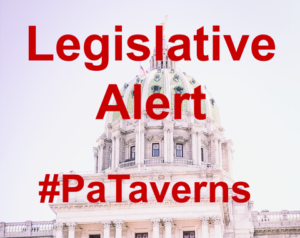PLBTA Written Testimony For State House Commerce Committee On Pandemic Mitigation Orders Impact On PaTaverns
 On February 3, 2021, the Pennsylvania Licensed Beverage and Tavern Association testified in front of the State House Commerce Committee concerning the negative impact COVID-19 mitigation orders are having on small business taverns and restaurants. Representing the PLBTA was Tom Tyler, president of the Association and owner of McStew’s Irish Sports Pub in Bucks County.
On February 3, 2021, the Pennsylvania Licensed Beverage and Tavern Association testified in front of the State House Commerce Committee concerning the negative impact COVID-19 mitigation orders are having on small business taverns and restaurants. Representing the PLBTA was Tom Tyler, president of the Association and owner of McStew’s Irish Sports Pub in Bucks County.
During the hearing, Tom shared with the committee members stories from our grassroots, which can be found by clicking here. In addition, the Association submitted formal testimony, which follows.
Testimony: Industry Survival
and Recovery Needs
to Preserve Businesses and Jobs
Presented to
Pennsylvania House
Commerce Committee
On
February 3, 2021
By
Thomas Tyler, President, PLBTA
McStew’s Irish Sports Pub, Owner
Chairman Roae, Chairman Galloway, members of the Committee, good morning. I’m Tom Tyler, president of the Pennsylvania Licensed Beverage and Tavern Association. I also own McStew’s Irish Sports Pub in Bucks County.
Let me begin by thanking you for inviting the Pennsylvania Licensed Beverage and Tavern Association to testify today about the struggles our industry faces as a result of the COVID-19 crisis and state orders. We appreciate being here to share the story of our Members and industry.
The Tavern Association represents more than 400 small business taverns, pubs, and licensed restaurants across the state. Most of our Members own “R” and “H” licenses while some may have an “E” or even a club license. For the most part, we are your local bars, taverns, pubs, and licensed restaurants. We do not actively recruit large chains, grocery stores, or convenience stores which also may have an R license.
In terms of business, our average Member makes a living primarily from alcohol sales. Based on our Membership studies, about 63 percent of their business is alcohol sales and 37% of sales are from food.
Our average member employs about 16 people, including the owner and family members. They serve less than 4,000 customers every month. If you count the chairs and barstools, throughout the Member establishments, you’ll find less than 100.
Simply put, our Members are your locally-owned, mom-and-pop neighborhood businesses.
For the sake of overall industry data, looking at the state list of active R, H and E licenses, there are about 9,400 licensees that are not grocery stores, convenience stores or large chains. These are primarily small businesses. And the impacts of the prevention and mitigation orders on them are extremely different than the impacts on those other types of restaurants and licensees.
Knowing that my average Member employs about 16 individuals, Pennsylvania’s small business R, H and E licensees create around 150,000 jobs. And more than half are women, many are single mothers.
Last year, we surveyed small business licensed restaurants and taverns to learn more about how the COVID-19 crisis was impacting their businesses. Our study clearly shows the struggle these establishments are having. Our study also supports findings we’ve seen from national-level studies.
For example, on average, 13 employees per establishment lost their jobs at some point during the pandemic as a result of COVID-19 Orders. That’s on a par with national studies that estimated 81 percent of industry employees were laid off or furloughed as a result of the pandemic orders. When just considering our small business R and H license locations, the state orders likely resulted in about 110,000 jobs lost in Pennsylvania – before considering the many companies that supply food, alcohol and services to our members.
Our survey also found that without any change in the state’s COVID-19 order, there’s a good chance that as high as 70 percent of our members may not survive. This includes more than one out of six that are either already closed and those who will be forced to close as the pandemic’s mitigation orders continue in 2021.
One key point to remember about this segment of the industry is what I mentioned very early in this testimony. Most of our business – 63 percent on the average – is related to the sale of alcohol. Our profit margins are from 3-5% in good times.
When mitigation orders set an early last call, reduce indoor capacity, and take away bar seating, it’s very easy to make the connection that small business taverns and licensed restaurants will see a significant financial loss since the largest portion of their business is being suppressed. Thus, the results from our survey clearly should be anticipated.
What my Members really want is to work at full capacity. They’re not looking for another loan.
But, since operating at 100 percent is not going to be allowed anytime soon – or at least until there’s widespread distribution of the vaccine – they have no choice but to seek survival and then recovery help to make up for not being allowed to use their licenses at 100 percent.
We are now in the coldest months of the year which makes outdoor seating problematic. This comes right after holiday mitigation orders closed indoor service, resulting in significant financial loss.
This combination makes it particularly important for the legislature to take action now to help the industry financially.
Based upon our survey, we know that a high percentage of Members believe grants are needed to help pay bills and make up for lost revenue due to mitigation orders. This is fair for R and H licenses holders to ask. They’ve been told that they must limit their indoor service to either 25 or 50 percent, but they also have bills such as electricity and mortgages that must be paid at 100 percent. I have to note that all four caucuses and the Governor, in the weeks leading up to the November elections, called for grant programs to assist our members, ranging from $145 million to $400 million. And now its five months and another shutdown later, without any help. While corporations and franchises may be able to function at near normal, our members cannot. Our business models are different – McStews is not McDonalds, and none of our members businesses are based strictly on take out sales of beer and wine like retailers and convenience stores.
Loan programs will not help our members. They have already borrowed in their efforts to remain viable during the continuing changes from shutdowns to partial openings, to further shutdowns and several variations in between.
Outside of industry-specific grants, reasonable actions the state can easily take to relieve some financial burdens are as follows:
1. Increase the state wholesale discount from 10 to at least 15%
2. Allow those with a small games of chance license to retain all revenues from the sale of such games, similar to what was done last year for clubs. And consider possible expansion of small games of chance.
3. Waive licensing fees beyond this year. Saying that, please understand that waiving license fees is insignificant in terms of the costs we’ve already incurred. These fees amount to $600-1,500 per licensee, about as much as one good weekend night’s profits.
More complicated, but certainly something the legislature should investigate, would be relieving the industry of unemployment claim charges, eliminate sales tax payments or at least eliminate fees and penalties for late payments.
The legislature should also take a serious look at increasing gaming revenue by legalizing VGTs and/or skill games in taverns. This would benefit both the state and taverns.
Outside of financial help, as distribution of the vaccines increase, we would urge the easing off mitigation orders.
Specifically, we would like to see taverns be allowed to seat individuals at bar tops again, provided establishments follow appropriate social distancing rules or use barriers. Many had already spent money to make these changes before the rules were changed for them.
Our smallest establishments typically have very little table seating and no outdoor seating. This change would help our smallest taverns survive.
Industry survival is not a partisan matter, and we know that both Republicans and Democrats are concerned for our future – and our communities. You demonstrated your concern early last year when you passed legislation to allow the sale of mixed drinks to go on a temporary basis. And, we appreciate that opportunity. We would urge that sales of mixed drinks to go be made permanent, which other states are now doing, and that the temporary rules on outdoor dining be extended permanently as well.
More legislative help is needed, and it’s needed quickly.
Our industry is in financial distress. Our local taverns and licensed restaurants need help if they are going to make it through this crisis and save jobs.
Thank you for the opportunity to present this testimony, and I welcome questions.






